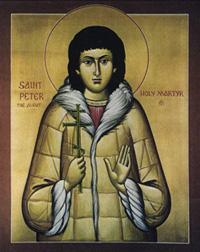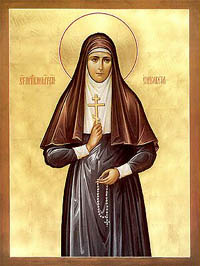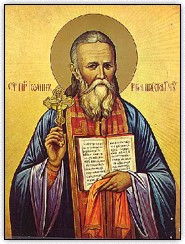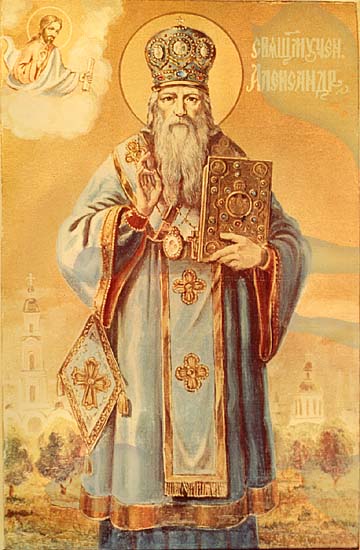One by one, the authorities began shutting down the churches in Kharkov. Finally, in all of Kharkov and its outlying districts, only a single church remained open, the parish of St. Nicholas on Kholodnaya Gora ("Cold Mountain"). It stood at the very edge of the city, and the faithful would converge upon it without any particular dread of consequences. Vladika came by cab, from the other end of town, a good 5 km away. Then the day came, when the local authorities decreed that Bishop Aleksandr must share the use of this church with another bishop, one of those who had accepted the so-called obnovlenchestvo edicts. [The obnovlenchestvo movement was an affliction which assailed the Russian Church in the years immediately following the Bolshevik Revolution, when the theomachist and militantly atheist authorities used terrifying threats and inducements to force radical changes in Church governance, nominally for the sake of modernization, but in fact with the sole purpose of eviscerating Orthodox Christianity by subverting its canonical foundations, as a prelude to driving it into extinction. These efforts came to nought, through Gods mercy and grace; however, for a time, the rancour, divisions and chaos inflicted by the obnovlentsy bishops and priests were indeed destructive. Tr. Note.] The authorities dictated that the Orthodox Bishop, his clergy and his flock would be allowed to use this last available church only on alternate Sundays the other Sundays, it was to be surrendered to the obnovlentsy for their services. The congregation was unanimous in its complete opposition to this demand. Finally, it was decided that one of the auxiliary chapels of the main church would be relinquished to the obnovlentsy, through the addition of a wall to separate the two congregations from each other. A fortnight later, the solid partition was in place, in spite of the violent objections of the local authorities. A mere 40 people at most chose to attend the services of the so-called Living Church [a term used by the obnovlentsy to differentiate themselves from the Orthodox Tr. Note], having constituted themselves into a parish meant to supplant the true Orthodox, with the authorities providing handsome salary packages for the compliant clergy and full-time choir. Meanwhile, in the main church of St. Nicholas, there were so many worshippers that the Communion rite alone would last for several hours, and there would be a multitude of Baptisms to perform before every Vigil service (up to 120 on a single date). People travelled great distances to attend these services, standing patiently for the many hours of their long duration. Vladika would often exhort the people to sing, particularly during the Litany of Petitions. He would say: "Is that how you would be asking a mere mortal to grant you help, with such coldness? Is that how we make our pleas? Everyone, sing! Grant it, O Lord!" That would be when a multitude of thousands would begin to sing out to God, with one mouth and one mind and one heart, and such a force of prayer would pour forth as few today have even a capacity to comprehend. The gregarious, sociable personality, quick and lively character, and kind heart of the saint were joined to profound wisdom, a gift for easily resolving conflicts and overcoming difficulties, for reconciling and inspiring other human beings.
Inevitably, the fate shared by all who zealously defended the True Church befell Vladika Aleksandr as well. He saw this inevitability coming, and continuously exhorted his faithful to remain strong, never despairing in the face of adversity: "Whatever might come, stay strong, stay faithful and steadfast." To his closest friends, he confided that he was the last faithful bishop remaining in the south of Russia. On 20 June 1938, Archbishop Aleksandr was arrested by the UNKVD [one of the many acronyms used at various stages of the Soviet era by the internal state police assigned to persecute and destroy "enemies" of the totalitarian regime Tr. Note], on charges of counter-revolutionary propaganda and agitation. On 17 July 1939, a military tribunal of the Kharkov Military District convicted him, sentencing him to 10 years of incarceration in the prison of Kholodnaya Gora. The day he was brought to that prison became a momentous event for its inmates. The tall, imposing, saintly presence of this venerable holy father created a great stir; he was met with reverence by all the prisoners. His stay, however, was destined to be brief: on 24 May 1940, aged 89, he left this life. How? God alone knows. Some of the prison staff said he was strangled. The documentary evidence is stark: the record indicates that in May of 1940, the Kharkov morgue received "from the NKVD facility for the terminally ill at Kachenevka, the corpse of an elderly male, with a numbered tag on the foot, and papers indicating the surname Petrovsky, with instructions for interment." An individual working at the morgue, formerly a subdeacon of the Archbishop, together with a gatekeeper of his who subsequently became an ordained priest (archpriest Ioakim Orekhov), immediately recognized








